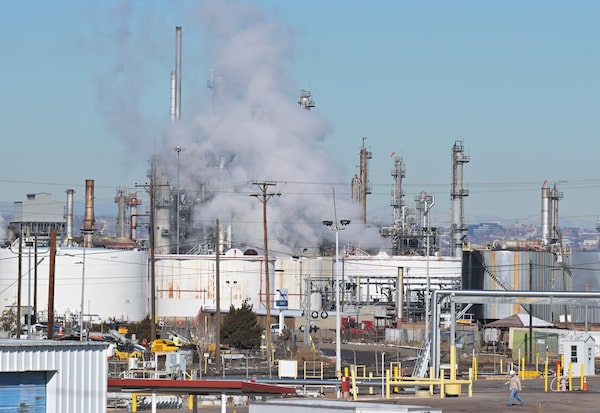
Suncor Refinery in Commerce City, Colorado on Feb. 5.RJ Sangosti/MediaNews Group/The/Getty Images
The Colorado Department of Public Health and Environment has announced a US$10.5-million fine against Suncor Energy Inc.’s SU-T refinery in Commerce City, Colo., calling it the largest enforcement package against a single facility for air pollution in the agency’s history.
The regulatory action relates to air-pollution violations that occurred from July, 2019, to June, 2021. Under the package, Calgary-based Suncor will have to put at least US$8-million toward projects meant to reduce air pollution resulting from power outages, which CDPHE said were linked to many of the company’s violations.
The enforcement package also includes penalties of US$2.5-million, with about US$1.3-million earmarked for disproportionately affected communities through Colorado’s environmental justice grant program.
Under a separate action, Suncor must double the number of air pollution monitors around the site compared to the refinery’s original fenceline monitoring plan, the agency said.
“Today’s actions demonstrate our unwavering commitment to environmental protection and the health of our residents,” CDPHE executive director Jill Hunsaker Ryan said.
Alberta to the world: We’ll take your greenhouse gas emissions
Suncor’s Commerce City refinery is a major player for the company and for the state, processing some 98,000 barrels of crude oil a day and selling nearly 95 per cent of its products within the state, according to Suncor’s website. But the refinery has also become a target for local groups worried about how toxic emissions are affecting the environment and area residents’ health.
CDPHE acknowledged those concerns in announcing its regulatory action.
“The communities that live and work near Suncor have experienced unfair air pollution burdens from the refinery’s permit violations for too long,” said Trisha Oeth, CDPHE’s director of environmental health and protection.
“We are committed to protecting people’s health and well-being – and today’s actions show we mean it,” Ms. Oeth added.
Lucy Molina, a community organizer with environmental group 350 Colorado, called the announcement “disappointing,” saying the enforcement action shows more concern for Suncor’s continued operations than community health effects.
“This is really a slap on the hand and an insult to the community,” she said.
The record-setting fine won’t directly benefit communities affected by Suncor operations, Olga Gonzalez, executive director of Colorado non-profit Cultivando, said in an e-mail.
“There is no money to compensate low-income families for the excessive costs of taking their sick children to the doctor because they have continuous nosebleeds, breathing problems, asthma and cancer. We are in a sacrifice zone. Our children are sacrificed for cheaper gasoline without regard for their health or for the health of our environment,” Ms. Gonzalez said.
Suncor’s climate pullback is the latest sign federal incentives are not enough
In an e-mailed statement, Suncor spokesman Leithan Slade said the company is committed to continuous improvement and meeting regulatory requirements.
The company is working on a plan to improve electrical reliability and that plan is required to be complete by the end of 2026, Mr. Slade said.
Suncor voluntarily installed an interim fenceline monitoring system that was launched on Jan. 1, 2023, and met the requirements of the fenceline monitoring law, Mr. Slade said.
Data from that interim monitoring system indicate that measured covered air toxic compounds have remained below detection since the program began, he said.
A final fenceline monitoring system will be operational by the end of this year, Mr. Slade said.
Fenceline monitoring involves setting up and running air measurement equipment around the perimeter of a facility.
Suncor’s poor performance compared with its peers, along with a string of safety incidents, in 2022 made it the target of an activist U.S. hedge fund that pushed for a management shakeup and the potential sale of Suncor’s Petro-Canada gas station chain. The company recorded five workplace fatalities between December, 2020, and July, 2022, when then-chief executive officer Mark Little resigned.
In a November update, Suncor’s new CEO, Rich Kruger, said the company’s safety record was improving and that there had been no recordable injuries at all in the third quarter – the first injury-free quarter in the company’s history. For its fourth quarter, Suncor in January reported the second-highest oil output in its history.
 Wendy Stueck
Wendy Stueck